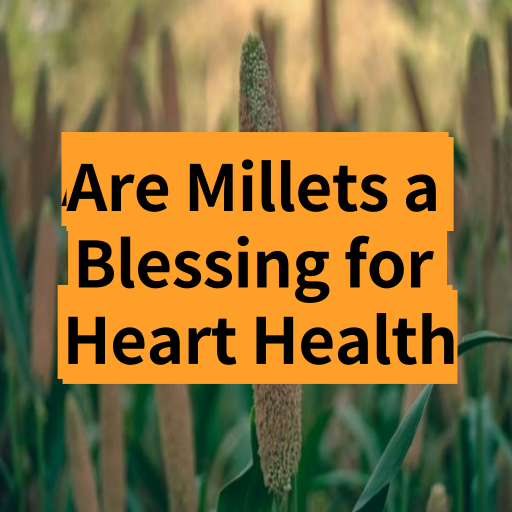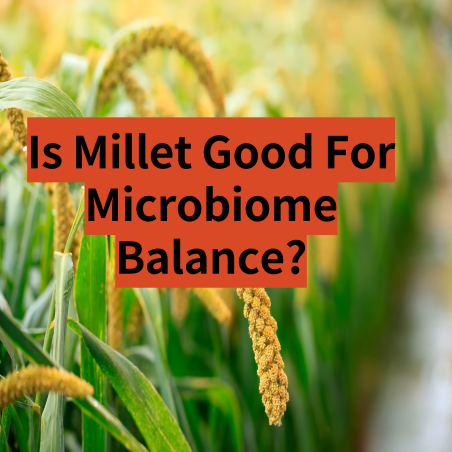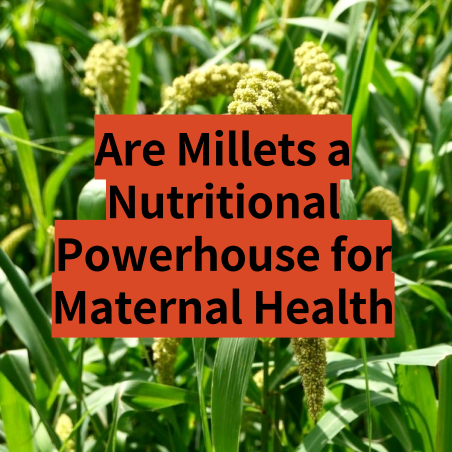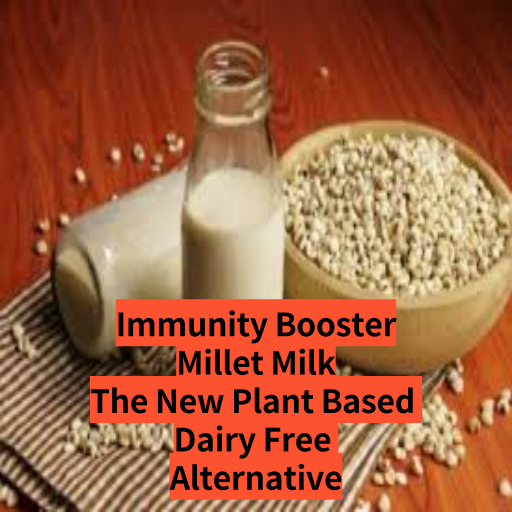Introduction:
Efficiency of the heart is essential. Considering that heart diseases continue to be common in the present fast-paced world and may cause death, the subject matter presented is critical in ensuring heart health.
In the course of these developments, the demand for healthy products for the heart has also grown substantially. Consumers are eager to find nutrition options which provide the necessary diet while promoting cardiovascular health and preventing negative heart-related outcomes.
This paper “Are Millets a Blessing for Heart Health” provides insight into millets – ancient grains that have recently become a subject of much research on account of their potential for boosting heart health and a wide array of other advantages for one’s overall physical condition. Millets is the term that collectively refers to ancient cereal species that have been cultivated in various parts of the world for thousands of years.
Millets are a promising food option for those wanting to put heart health at the forefront of their daily eating patterns, thanks to their high fiber levels and numerous vitamins, minerals, and antioxidants.
Understanding Heart Health
In conclusion, heart health is a wide-ranging issue implying several parameters of cardiovascular well-being that are necessary not only to make their work proper but also to decrease risks of cardiovascular illnesses. Examining them more closely may help build the integrated idea of heart health support and a healthy heart, and recognize cardiovascular well-being.
- Cardiovascular Functioning: The core of heart health is lay on the efficient work of the heart and blood vessels. The heart is a muscular organ, which pumps the blood through the body must have steady rhythm as well as the sufficient blood flow to providing the tissues and organs with oxygen and nutrients. The blood vessels are also integral part in ensuring blood pressure, controlling the velocity of the blood flow and providing good circulations throughout the body. The disrupted work of the heart and blood vessels can contribute to the development of cardiovascular diseases and undermine the heart health overall.
- Cholesterol levels: This fatty substance is present in the blood, and while cholesterol is necessary for some body functions, its disbalance negatively affects heart. On the one hand, high levels of LDL cholesterol, known as “bad” cholesterol, results in the formation of plaque; when it accumulates in arteries, blood vessels become narrow, and its passage is restricted. High LDL death rates are resulted from atherosclerosis development, heart attacks, and strokes. On the other hand, HDL cholesterol, or “good” cholesterol, transports excessive cholesterol cells and reduces their deposits, which is why their levels support people’s hearts.
- Blood Pressure: A vital role is played by blood pressure levels in heart health. Hypertension, commonly referred to as high blood pressure, strains the heart and blood vessels thereby leading to severe complications such as stroke, heart attacks and heart failure. On the contrary, hypotension which refers to low blood pressure causes inadequate flow of blood to important organs in the body. This eventually leads to often being dizzy, frequently fainting and generally lowers one’s quality of life. Hence, maintaining a controllable level of blood pressure will keep off cardiovascular diseases like heart attack from an individual’s system.
Overall cardiovascular fitness: Aside from individual or genetic risk factors such as cholesterol levels and blood pressure, overall cardiovascular fitness contributes a great deal to the state of the heart. Involvement in regular physical exercise, eating a balanced diet, stress management, enough sleep, as well as the avoidance of substances such as tobacco, and excessive consumption of alcohol can all help mitigate cardiovascular fitness.The heart’s muscles’ strengthening, blood-circulation improvement in the body, blood-pressure regulation and protection of people against contracting cardiovascular diseases are therefore dependent on these factors.
An understanding of heart health involves taking note of the blending of different aspects as well as developing a routine which will take care of the entire cardiovascular system. Hence, the conscious choices and well-balanced healthy food can prevent CVDs and reduce risks to their hearts.
The Nutritional Profile of Millets
The nutritional profile of millets is impressive, making them a valuable addition to any heart-healthy diet. These grains are packed with complex carbohydrates, dietary fibre, protein, vitamins and minerals. It is worth noting that they have high levels of fibre, which aids in reducing cholesterol levels, regulating blood sugar and enhancing digestion.
Role of Millets in Heart Health
In brief, Millets are ancient cereals with broad spectrum of nutrients and many applications in the kitchen. They are of paramount significance in the enhancement of wholesome heart functionality as well as minimal chances of getting cardio disorders. The following millet-based mechanisms guarantee cardiovascular system fitness:
- Cholesterol Management: One of the key benefits of incorporating millets into your diet is their ability to support cholesterol management. Millets are rich in soluble fibre, which binds to cholesterol in the digestive tract and helps eliminate it from the body. By lowering LDL (bad) cholesterol levels, millets reduce the risk of plaque formation in the arteries, thereby reducing the likelihood of atherosclerosis and heart disease.
- Blood Pressure Regulation: Millets contain essential minerals such as potassium and magnesium, which are known for their role in regulating blood pressure. Potassium helps counteract the effects of sodium, promoting vasodilation and lowering blood pressure. By incorporating millets into your diet, you can support healthy blood pressure levels and reduce the risk of hypertension-related complications, such as heart attacks and strokes.
- Antioxidant Protection: Millets are rich in antioxidants, including phenolic compounds, flavonoids, and vitamin E, which help combat oxidative stress and inflammation in the body. Oxidative stress and inflammation are key contributors to the development of cardiovascular diseases, making antioxidants essential for maintaining heart health. By consuming millets regularly, you can bolster your body’s antioxidant defences and protect your heart from oxidative damage.
- Blood Sugar Regulation: Stable blood sugar levels are crucial for heart health, as fluctuations in blood glucose can increase the risk of diabetes and cardiovascular complications. Millets have a low glycemic index, meaning they cause a gradual rise in blood sugar levels compared to high-glycemic foods. This makes them an excellent choice for individuals looking to manage their blood sugar levels and reduce their risk of heart disease.
- Weight Management: Maintaining a healthy weight is essential for heart health, as obesity is a significant risk factor for cardiovascular diseases. Millets are nutrient-dense and low in calories, making them a filling and satisfying addition to meals. Their high fiber content promotes satiety and helps control appetite, making it easier to maintain a healthy weight and reduce the risk of obesity-related heart complications.
Incorporating millets into your diet is a simple yet effective way to support heart health and reduce the risk of cardiovascular diseases. Whether you enjoy them as a wholesome breakfast cereal, a hearty grain salad, or a comforting side dish, millets offer a delicious and nutritious addition to any heart-healthy meal plan. By embracing the heart-healthy benefits of millets, you can take proactive steps towards safeguarding your cardiovascular wellness and enjoying a vibrant and fulfilling life.
Incorporating Millets into Your Diet
Millets are incredibly versatile and can be used in various culinary applications. From whole grain salads and porridges to stir-fries and baked goods, there are numerous ways to incorporate millets into your diet. By making millets a regular part of your meals, you can enjoy their heart-healthy properties while adding variety and flavour to your diet.
Conclusion:
We cannot emphasize enough the importance of taking care of our heart as we strive for the best health. The heart is the cornerstone of human’s well-being since it continuously pumps the blood responsible for sustaining human life in the body by strengthening cells and other essential body organs to enhance human energy. We have a divine mandate to appreciate and safeguard this organ.
Certainly, having considered all the information outlined in this discourse, it is clear that heart health is not an occurrence matter but a matter of choice and conscious actions. Knowledge of the complex relationship of factors affecting cardiovascular health gives us the opportunity to make reasonable decisions which aim at supporting our heart and reducing the risk of developing heart diseases.
Overall, the road to the health of your heart is more than just diet or exercise but an intersection of several aspects of our existence. To achieve and maintain a holistic heart-healthy approach, one is called to treat this journey not only with a healthy diet but as an entire body, mind, and spirit adventure.
So, as we conclude our journey of exploring heart health and millets, let us indeed begin afresh – of love, concern, and self-love for the heart. Let us reflect with gratitude the heart’s extraordinary defense structure, which works day and night rigorously for our existence.
May our hearts be the living threads in the tapestry of life that tie us to our humanity – giving every moment life and meaning. May our hearts be the rudder that steers our course through time, for a future of health, happiness, and wholeness.
So, it is a voyage foretold, a voyage into the hope and gloom of newfound heart development, where our strides are merely a particularized expansion of the enthusiasm and expectancy with which we must dwell our best lives. Allow our aspirations be those of delight, vibrancy, and affection – permit our minds beat the rhapsody of sustenance that’s innate in every one of our lives.
FAQs for Are Millets a Blessing for Heart Health
FAQs:
Can millets help with weight management, and how does this relate to heart health?
Millet can help in weight management. This is contributed by the high fibre content of the cereal and its low glycemic index. Fibre provides a feeling of fullness, resulting in eating less food, while the low glycemic index regulates blood sugar, preventing sugar for high sugar consumption. Maintaining a healthy weight is paramount in maintaining cardiovascular health. This is because being overweight can cause hypertension and elevate matters such as sugar levels, which elevate the heart diseases risk.
Are there any potential side effects or considerations to keep in mind when consuming millets for heart health?
Generally consider millets being safe grains and even beneficial for the heart. However, since millet is high in dietary fibre, people who are not used to eating millets may experience mild digestive issues such as bloating, gas, or mild abdominal discomfort before their system gets used to them. Dietary fibre has a laxative effect and can lead to gastrointestinal problems in some individuals if consumed in large amounts. To avoid these issues, people should slowly increase their millet intake and consume plenty of water to support digestion. Also, people with medical conditions or who are already taking medication should consult a health professional before increasing their intake of millets.
Can millets be included in a heart-healthy diet for individuals with diabetes or pre-diabetes?
Yes, millets can be part of heart-friendly meals for diabetics or individuals with prediabetes. Since they have a low glycemic index, the blood sugar level is less affected. This will help in controlling blood glucose, which could help reduce the occurrence of spikes and slumps. Through the prevention of high and low blood sugar, potential hazards related to uncontrolled diabetes such as heart diseases, kidney conditions, and nerve harm would be reduced.
Still, it is crucial to note that it is necessary to control the serving sizes and millets’ consumption and consumption of millets, particularly for people with diabetes who need to control blood sugar levels closely. Consult a registered dietitian or medical provider who can design a fast, heart-healthy meal that works for your needs and lifestyle is recommended.













